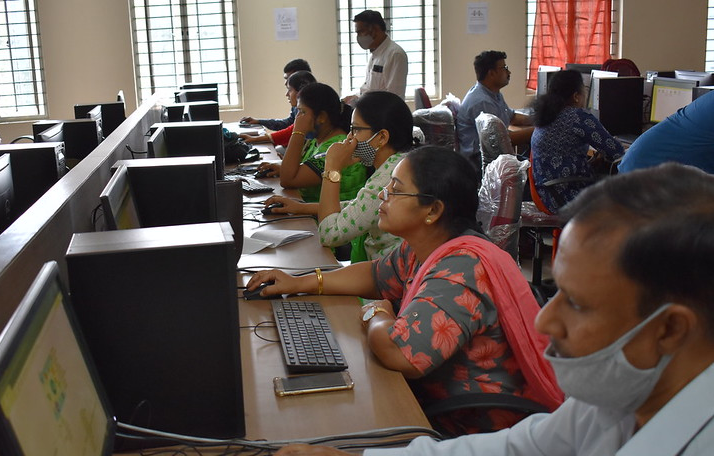Background
IT for Change (ITfC) and Commonwealth Educational Media Centre for Asia (CEMCA), New Delhi collaborated to design and conduct a five-day workshop on “Use of technology and OER for e-content development” for ODL professionals of Karnataka State Open University (KSOU), Mysuru. The workshop was organized by KSOU in their computer lab from March 22 to 26, 2021.
Workshop objectives
The workshop was designed based on the NCERT National ICT curriculum themes - Connecting and learning (accessing OER resources, participating in virtual learning communities) and Creating and learning (creating resources for teaching-learning using digital tools). The workshop covered different FOSS tools to access and create OER for their teaching-learning process. The following were the main objectives of the workshop:
1. Introducing the participants to Free and Open Source Software (FOSS) and Open Educational Resources (OER)
2. Exploring OER repositories to access resources and understanding the role of OER in teaching-learning
3. Accessing and creating Open Educational Resources (OER) by using Free and Open Source Software (FOSS) applications
4. Introducing participants to different tools for self-learning, collaborative learning, and resource creation
Workshop process
The workshop cohort was heterogeneous, with varying age and subject specialization. Participants included experienced and novice members in technology. Though some faculty members initially struggled to use the computer, towards the end of the workshop, they were quite comfortable in browsing for OER from the web and in creating resources. Each session was interactive, giving participants enough opportunities to understand and to practise OER creation.
Participants selected a topic from their subject area, to create OER using the tools taught in the workshop. During the workshop, participants accessed and downloaded OER from the web, and created concept maps, slide presentations, text documents, videos and interactive web-content on their topic. On the last day of the workshop, participants presented their resource library so that all could get an idea of the possibilities of accessing and creating OER using FOSS tools.
Workshop outcomes
During the workshop, participants showed great enthusiasm in learning new things. They became familiar with accessing and downloading OER and understood the role of OER and FOSS in teaching-learning and material making. They created OER resources using different FOSS tools and became familiar with Moodle FOSS Learning Management System and BigBlueButton webinar platform to conduct online courses.
Participants feedback
Here is what some of the participants had to say about the workshop.
- Using Ubuntu software we were able to learn more applications which is very friendly for using. We could learn how to access open resources, and were able to know the difference between licensed and non-licensed and know more applications in Google. - Dr Pavithra M (Department of Studies in Mathematics)
- Hands-on session on each topic helped participants to get practical exposure to specific software discussed in the session. All the trainers were so friendly, they attended and resolved each participant’s query - Dr Nandini H M (Department of Information Technology)
- Getting introduced to Ubuntu and other excellent software was a great experience. Surely all these will be of great use in my profession - Dr Hemalatha R (Department of Journalism and Mass Communication)
- This workshop made us to utilise maximum benefits of online sources in a legal way. Learnt many new educational applications to make our teaching effective. Overall, effective and enlightening sessions which made us to learn and enjoy to the core – Dr Madhura A.S. (Department of English)
For more details on the agenda and the course contents, please refer to the workshop page

